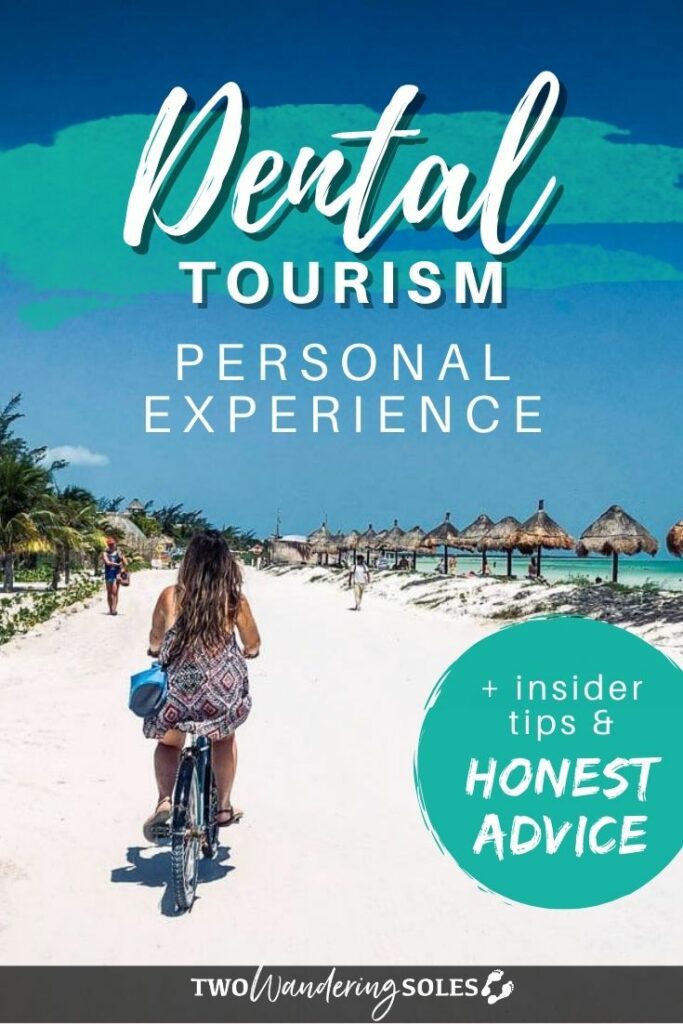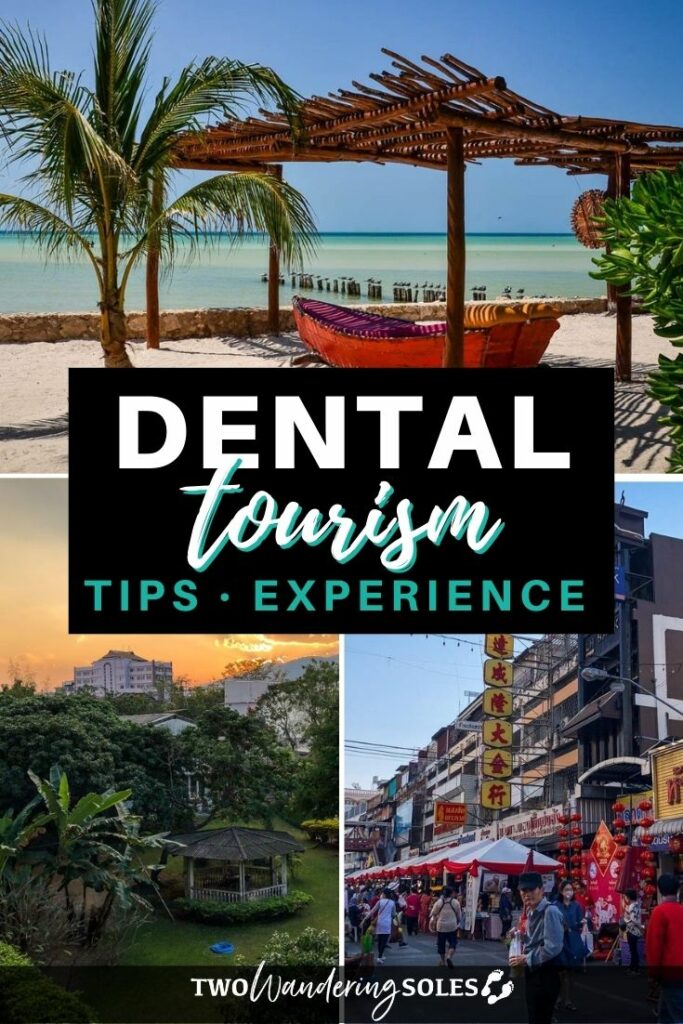In this article we’re breaking down the pros and cons of dental tourism, which countries are the best, and how to go about looking for a dentist abroad. This is all based on personal experience.
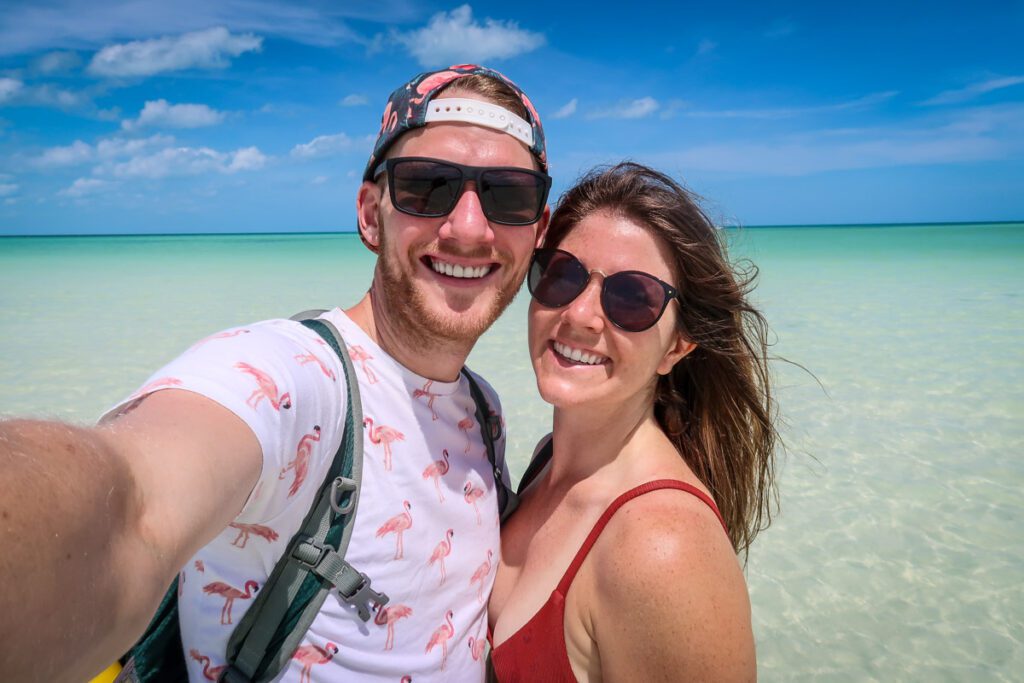
We typically write articles about exploring far-flung places, describing foods that blew our minds, sharing tips for bucket list hikes, and practical advice for planning your own dream trip.
This article is not like that.
This may be one of the most vulnerable articles we ever publish because it is about something very personal. Something I honestly don’t like to talk about.
And unlike travel, this topic isn’t sexy. In fact, it’s one of the least sexy topics out there, if you ask me.
But after giving this a lot of thought, I have decided that if my story helps even just one other person, it will be worth it.
So let’s get to the point, shall we?
This article is about dental tourism (aka getting dental work done outside your home country). In this article, I’m sharing my own personal experience with getting dental work done abroad.
I’m breaking down the pros and cons of dental tourism, which countries are the best for getting dental work done, and how to go about looking for a dentist abroad.
This is all based on my personal experience.
When I first started looking into dental tourism, I felt alone. Dental procedures aren’t something people often share much about, so I didn’t have anyone who had gone through something similar to talk to about it.
After a major dental surgery in Mexico, I shared a bit on YouTube and on Instagram and was incredibly surprised by how many people it resonated with. For the past 3 years, we have gotten emails on a regular basis from people considering dental tourism and asking for advice.
I decided that it was finally time for me to put down all my experiences and tips so that someone else going through something similar doesn’t feel as alone as I did.
If you’re considering getting dental work done abroad, it is my hope that you’ll find hearing about my journey helpful.
Dental Tourism Guide
- Why consider dental tourism
- My dental condition and story
- Crazy dental stories while traveling
- Where I’ve had dental work
- Best countries for dental tourism
- How I found my dentist in Mexico
- My experience with a dental tourism referral service
- My dental situation now
- Pros & cons of dental tourism
- Tips if you decide to get dental work done abroad
Disclaimer: Before we dive in any further, I do want to make it clear that we are not medical or dental professionals. The purpose of this article is not to give medical or dental advice, but to share my personal experience.
Why people seek dental care outside the USA
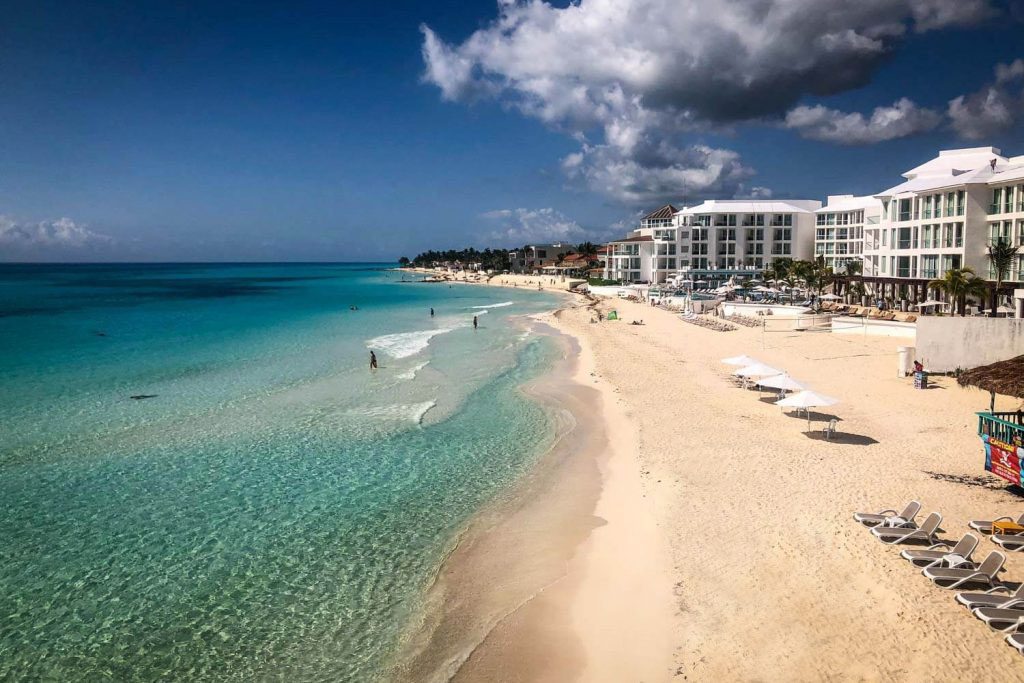
There are many reasons people choose to seek dental care abroad, but the biggest reason is typically because there can be huge cost savings.
Often, paying for a flight, a hotel, and dental work in another country can add up to just a fraction of what you’d be paying for the same work in the USA.
Yes, really. (I’ll share some actual numbers later on.)
As long as you do your due diligence to choose a highly experienced dentist, you will likely be receiving dental work that is the same quality as you would at home.
Here’s an example of what I mean…
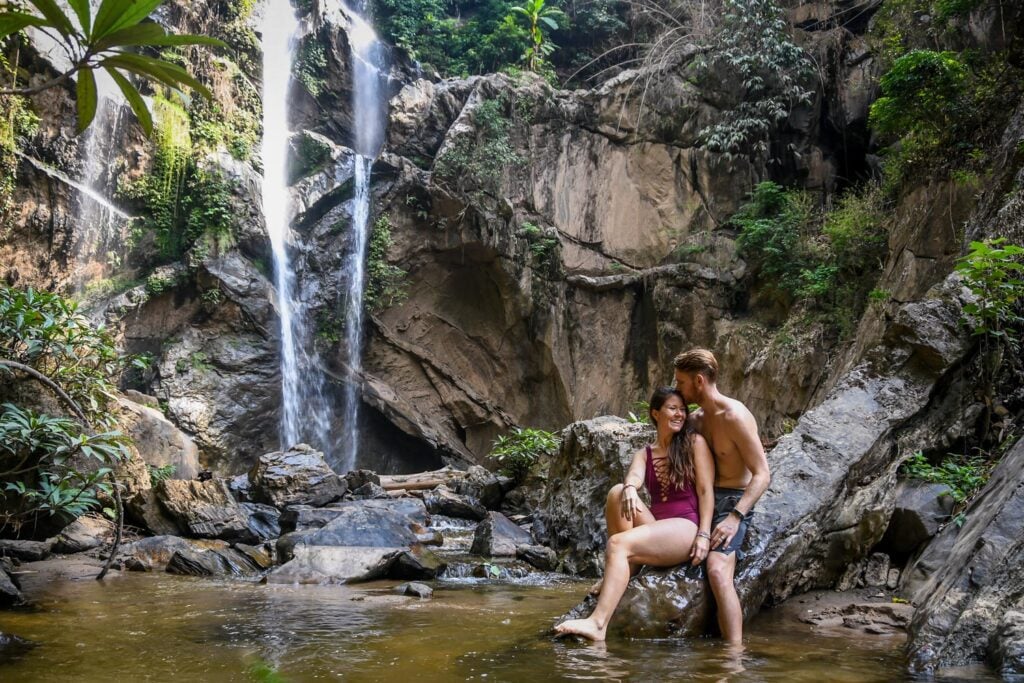
When we were living in Chiang Mai, I experienced some pretty major pain in my teeth. I did lots of research in expat groups and read reviews online to find a dentist I trusted.
After getting scans of my mouth, it was determined that I would need 3 teeth pulled, implants put in, and crowns on each.
It was a huge shock to hear that news.
In the USA, that amount of work would cost somewhere around $18,000. We were just starting to get serious about blogging and had quit our jobs and certainly didn’t have that amount of money lying around.
Want to know how much I paid for the same procedure in Thailand?
$7,500.
While not exactly cheap, it was less than half of what I would have had to pay in the United States. (And for the record, you can find cheaper dentists in Thailand, but I was happy with this particular dentist.)
So how does the quality of dental work compare?
My dental surgeon in Thailand did all her training in Indiana. She used the same type of implants (Straumann) as my surgeon in Bend, Oregon. Since then, I’ve had several US dentists say that it is great work.
Note: We are from the USA, so in this article we are mostly comparing dental care in other countries to the United States (based on our personal experience). It’s not just US citizens who are seeking dental care abroad, so you may have to do some research on costs in your home country.
Why is dental work in the USA so much more expensive than in other countries?
It’s a number of factors, including the cost of living, the amount of student debt dental students take on, and insurance that all medical professionals need to have.
If cost is a factor to you (as it is for most people!) and you need to have significant dental work done, dental tourism can actually be a really good option as you can save tens of thousands of dollars.
My dental condition & story
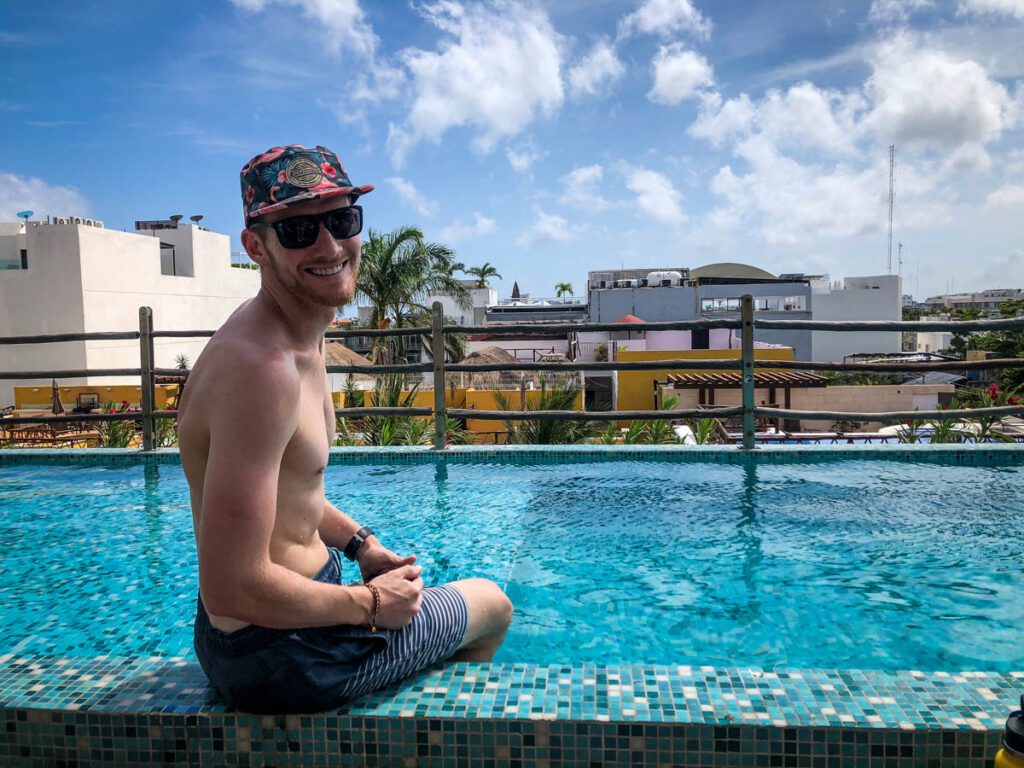
I was born with a rare hereditary condition called amelogenesis imperfecta where I do not have enamel on the outside of my teeth.
Despite being extremely diligent about my oral hygiene, my teeth are very weak and prone to cavities since they lack enamel (aka the hard protective layer that covers your tooth and helps prevent cavities and infections).
My mother and grandfather both had this condition as well.
When I was younger I had yellow teeth and had to go to the dentist frequently for various issues.
When I was 18 years old and had all my adult teeth, I underwent a full mouth reconstruction where all my original teeth were shaped down and crowns placed on all of my teeth.
I had several planned root canals, but most of my root canals were done as a result of my tooth root flaring up and killing itself. These were emergency root canals and extremely painful.
Today, I have root canals on all my original teeth except for three.
In the span of 12 months during my senior year of high school, I went to the dentist 52 times. I even played in a few football games just hours after having a root canal! It’s hard to keep your mouthguard in when it’s still numb from novocaine, haha!
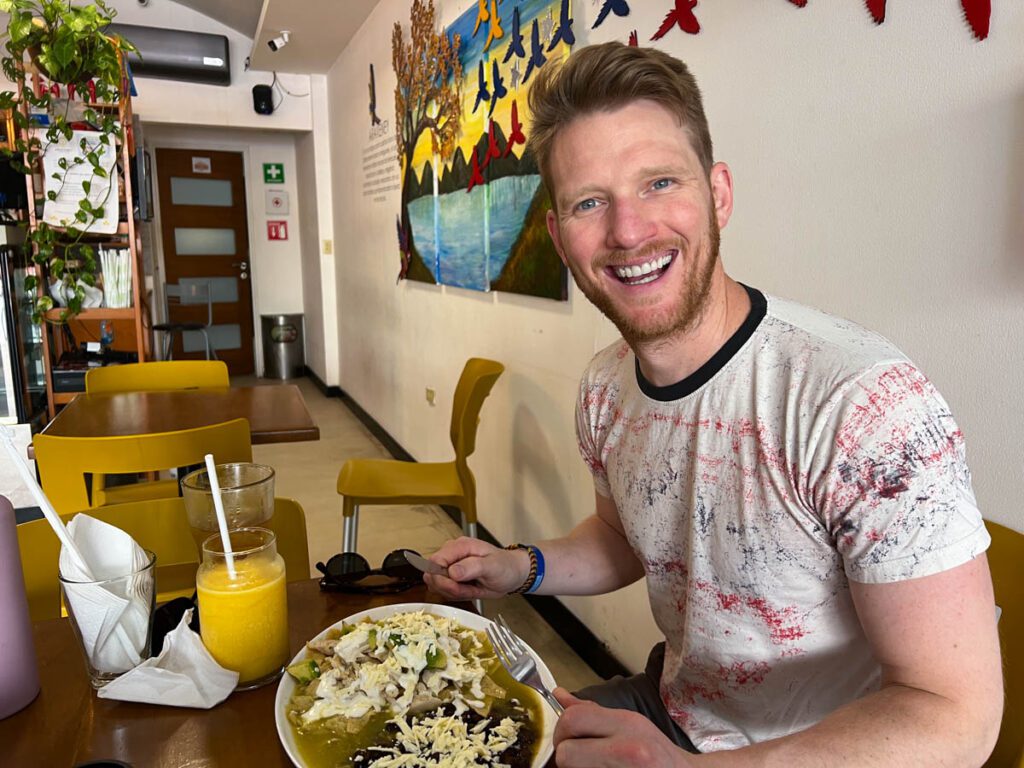
By the end of my reconstruction, nearly all my teeth had root canals and all of my teeth had crowns.
These crowns were supposed to act as the first layer of defense for my teeth for several years, and they did; but because of the nature of my condition, I frequently had complications, which leads me to the next point…
Crazy dental stories while traveling

I’ve had several dental issues pop up over the years and it’s uncanny how many times problems occurred when we were off doing something epic.
Katie and I worked hard to save up money so we could quit our jobs and follow our dreams of traveling the world. But while we were on a lot of these incredible adventures, I was dealing with dental problems behind the scenes.
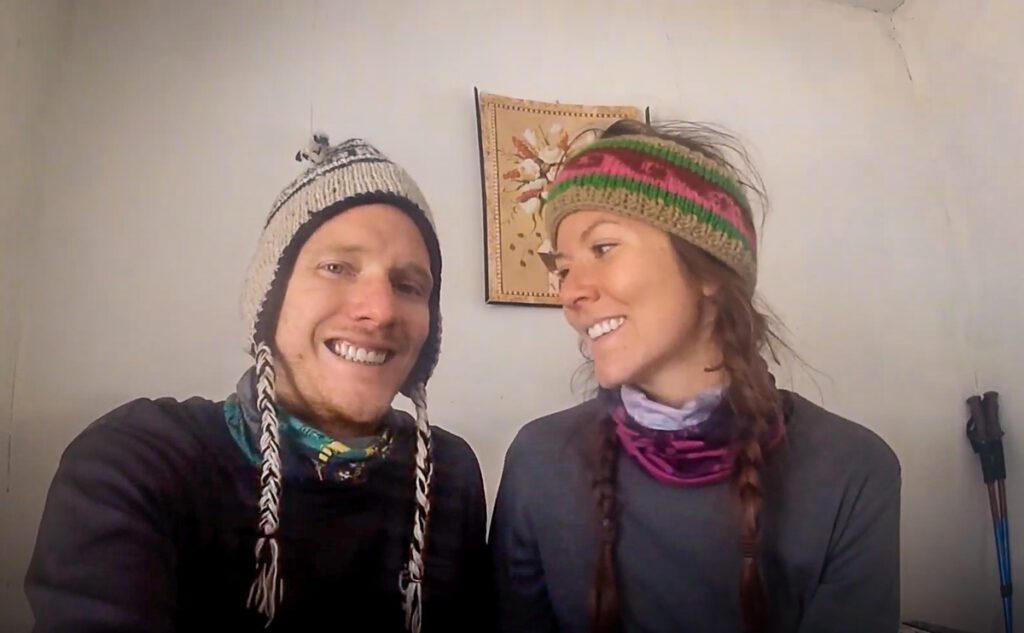
Here is just a sampling of my issues:
- Massive tooth infection while on a canoeing/backpacking trip on the Rio Grande River during spring break in college
- I lost a crown the day before we were going to hike to Machu Picchu in Peru
- Massive tooth infection while teaching English in South Korea
- Massive tooth infection while trekking to Everest Base Camp in Nepal. I had to buy antibiotics from the highest pharmacy in the world.
- I had a crown fall out and needed a tooth to be shaved down because of decay while working at a ski resort in Washington
- Needed several molars removed and implants placed because of apex root infections while living in Chiang Mai, Thailand
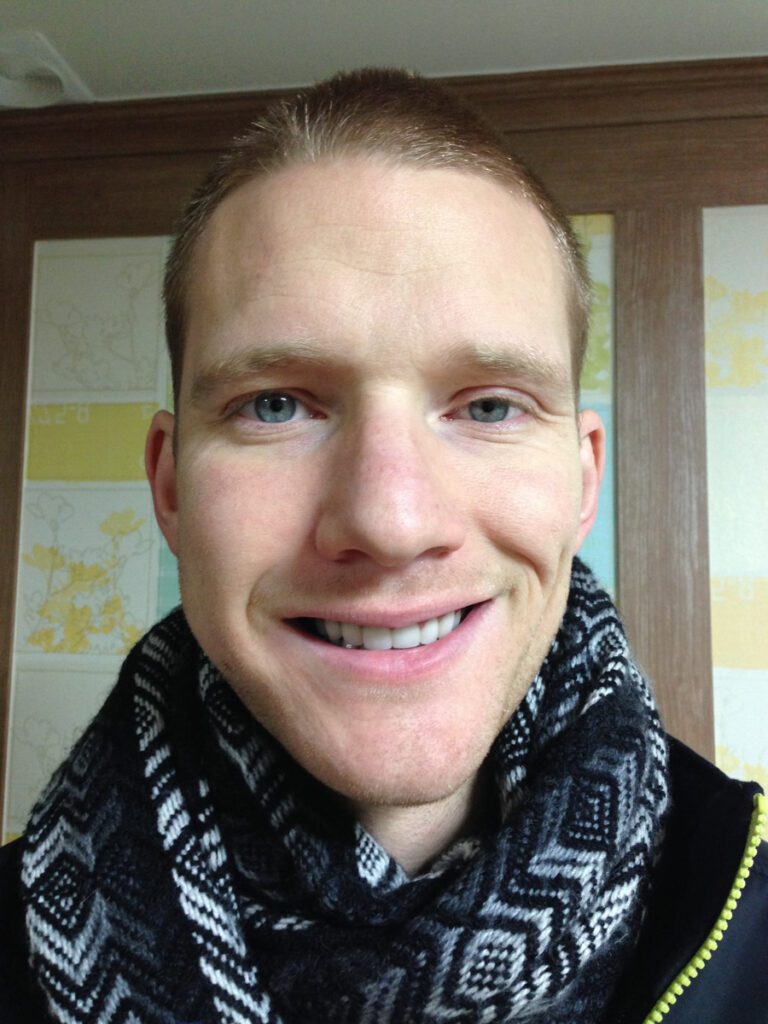
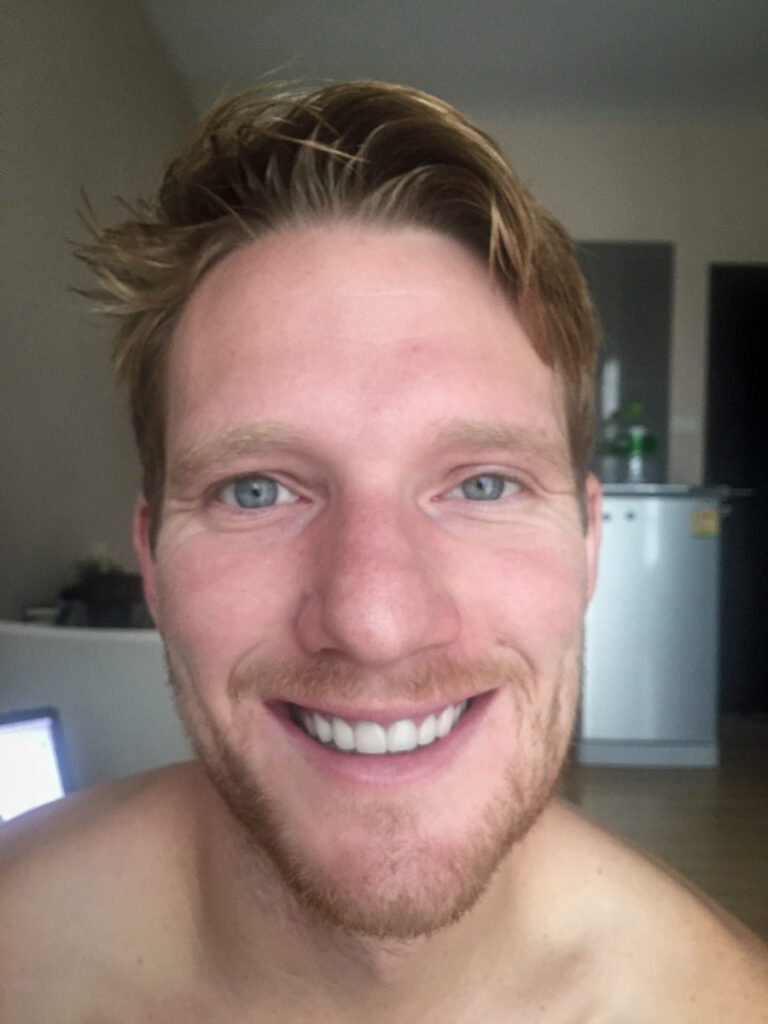
I’m proud that I haven’t let my dental issues stop me from chasing my dreams and seeing the world, but it hasn’t been easy.
Where I’ve had dental work
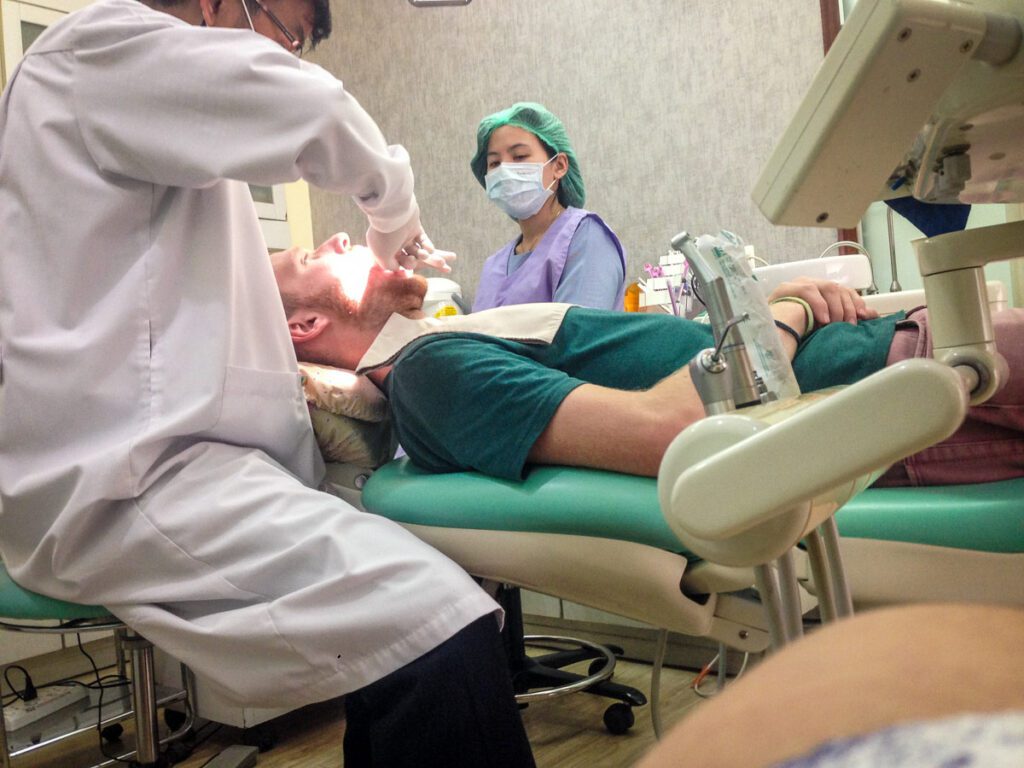
When we were traveling and living abroad, we would periodically get our teeth cleaned and oftentimes they would cost around $30 USD for a full mouth cleaning and checkup. We received teeth cleanings in South Korea, Vietnam, Thailand, and Bali.
(Our Director of Content, Amanda, has also had her teeth cleaned in Mexico, Turkey, and South Africa – to give you an idea, you can get this done pretty much everywhere!)
For major dental procedures (i.e. tooth extractions, implants, and crowns) I have gotten work done in Chiang Mai, Thailand, and Cancun/Cozumel, Mexico.
In Chiang Mai, I went to Grace Dental Clinic. It’s a wonderful facility with the latest technology and a very kind staff (and yes they all speak English). Most of the dentists at Grace are trained at universities around the world, like California, Minnesota, Indiana, Berlin, and Norway.
At Grace Dental, I had teeth extracted and 3 implants placed. If we lived closer, I would definitely go back to Grace Dental for all my dental needs.
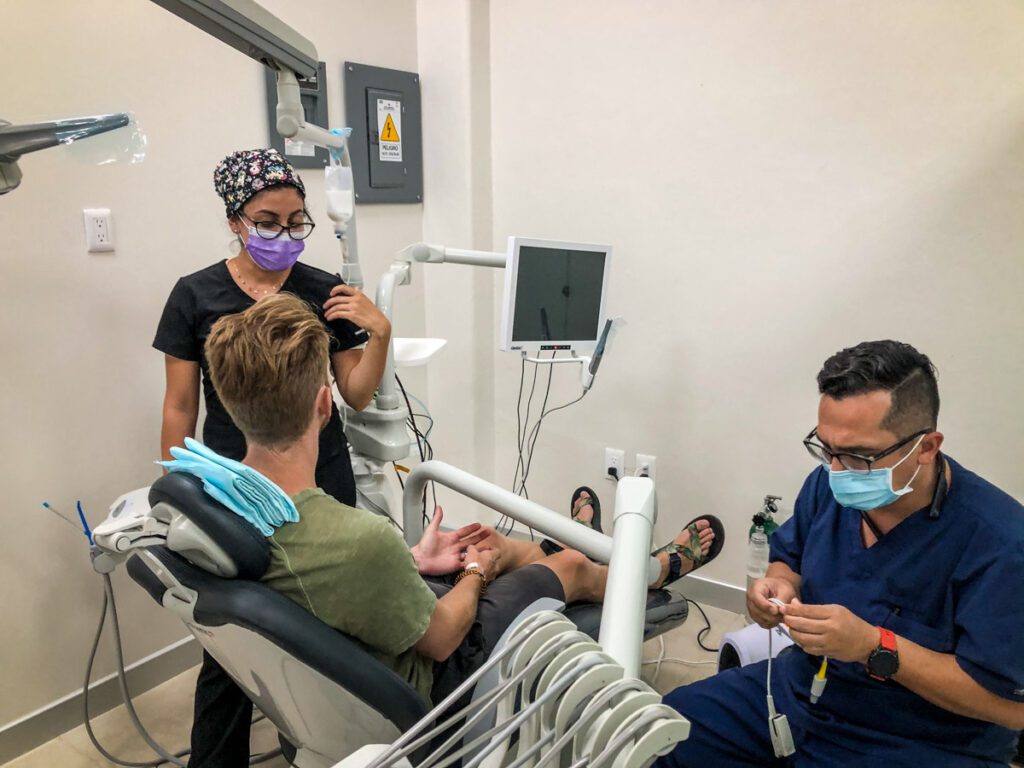
Also, I had major dental work done in Mexico, specifically in Cozumel and Cancun. I found my dentists here through a Mexico dentist vetting service. They paired me with an oral surgeon and prosthodontist who is often flown all around Mexico to teach and perform dental surgeries.
In Mexico, I had several apicoectomy surgeries to clear out infections at the root of my teeth. I also had 3 teeth extracted and 3 implants placed.
Best countries for dental tourism
The best country for dental work is a subjective opinion, however, here are some that are popular due to their accessibility and low cost:
There are plenty more great options as well, but these are where I’d personally recommend you start looking.
What type of dental work can you get done abroad?
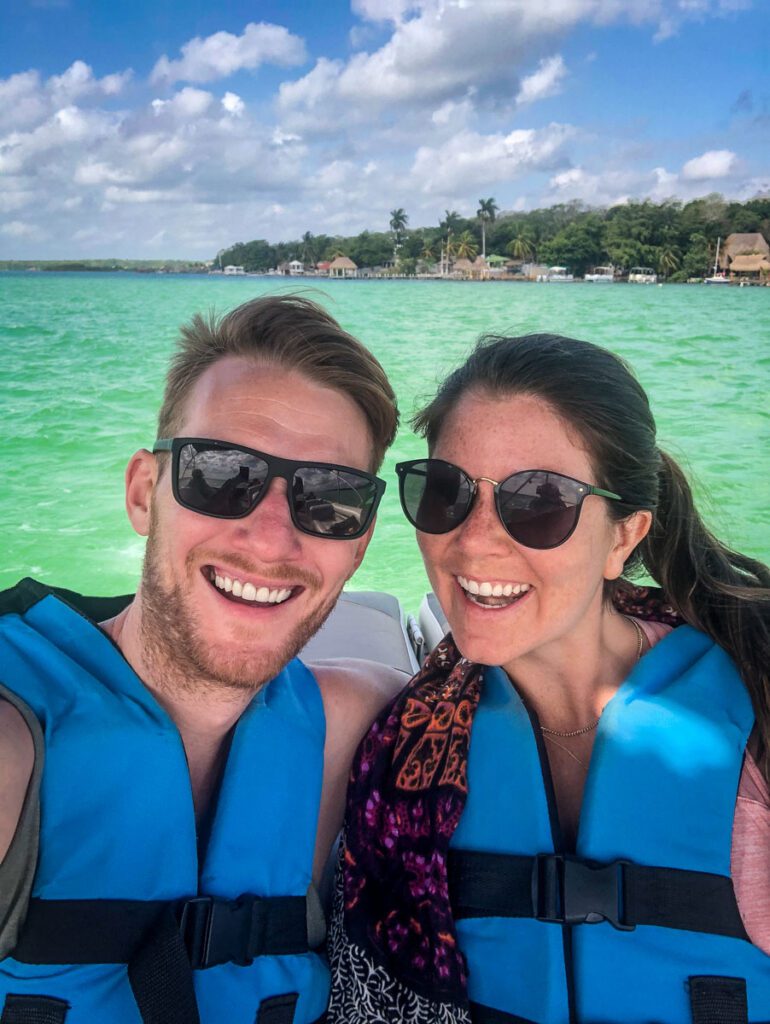
Now, when I say dental care, I’m referring to procedures that are much more in-depth than a cleaning or basic filling.
That said, both Katie and I have gotten dental cleanings in several countries around the world and have had good experiences, so if you’re on a trip and feel the need, go for it. It’s often very affordable.
You can get any kind of dental procedure done internationally as you can get in the US (or your home country), and typically it is a fraction of the cost. Here is a short list of dental procedures you can find abroad:
- Veneers
- Fillings
- Teeth whitening
- Crowns
- Implants
- Dentures
- Implant Dentures (All-in-4 or All-in-X)
- Root Canals
- Gum Disease Treatment
How I found my dentist in Mexico
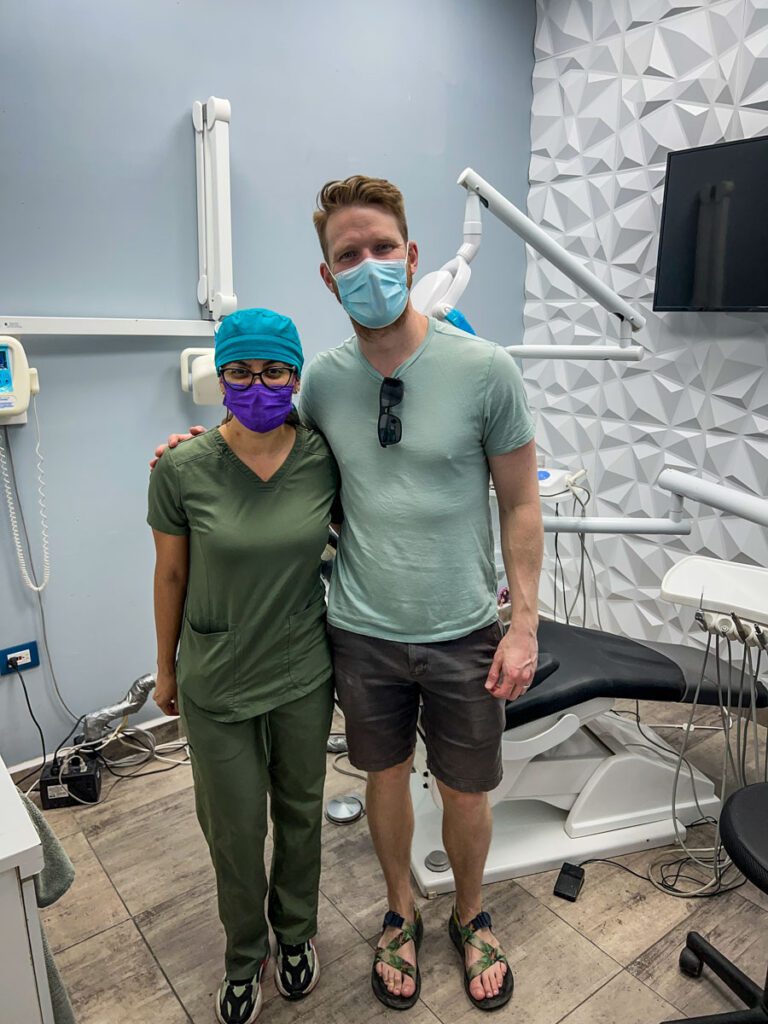
While I had a good experience in Thailand from Grace Dental, I knew I had to find somewhere to go that was closer to the US, as I would most likely need to go multiple times throughout my life.
When looking for affordable dental care in North America, I discovered a dental tourism referral service. They carefully vet dental clinics in Mexico to make sure they are up to international quality standards.
As with most destinations around the world, there are some good dentists and there are some bad dentists. Using a reputable dental tourism referral service takes the research and guesswork out of finding a good dentist in Mexico. They have helped thousands of people get affordable dental care in Mexico.
If you or someone you know needs dental care, drop your email below and we’ll send you the contact info for the referral service we have used and trust.
Full transparency: We earn a small commission if you do decide to go with the referral service and tell them you heard about the company from me at no extra cost to you.
My experience using a dental tourism referral service
In late 2020, I was having issues with my teeth swelling and open infections in my gums. After a scan at my dentist in Oregon, we found out I had 11 infections at the roots of my teeth and 3 of those teeth needed to be extracted because the infection was touching my sinus and another was encroaching on my jaw bone nerve (Aka a pretty serious thing).
We reached out to a dental tourism referral service and we sent all my scans to them for review. Within the week we had a video chat with the coordinator, the Mexican dentist, and my liaison in Mexico. They presented a treatment plan and we agreed on dates for surgery a few days later.
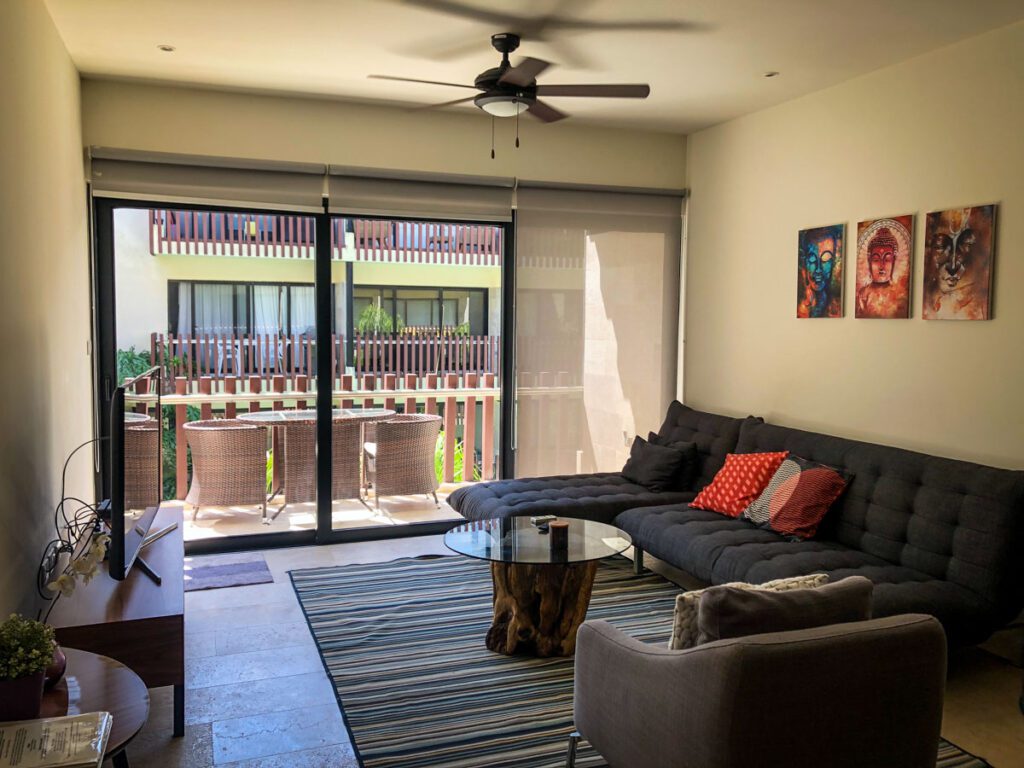
We booked flights for a month or so later (around March 2021) and the company assisted us to find accommodation while we were in Mexico. When we landed in Cancun, they even coordinated a driver to bring us to our Airbnb in Playa del Carmen.
Our liaison in Mexico then met us the next day to get the necessary scans and went over the procedures once again. We got prescriptions ready and picked them up at the local pharmacy.
The day of my surgery, the liaison picked us up and drove us to the clinic and he waited while my surgeries were performed. After the surgery, the liaison (and the dentists) made sure we got back to your hotel safely.
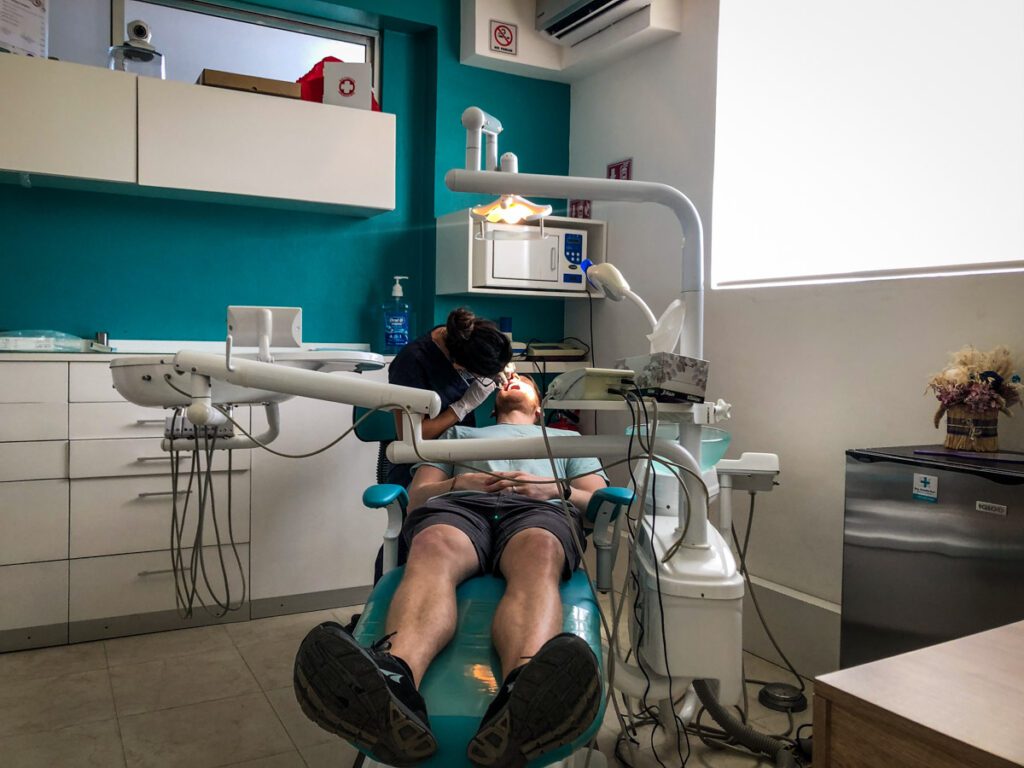
Throughout the next few days, the dentist and our liaison checked up on me to see how the recovery was going and responded to us if there were any issues.
After talking to the referral service coordinator, she said that if I came to Mexico alone, for certain procedures I could sign up to get a nurse to be with me 24 to 48 hours after the procedure. The nurse would help administer meds, check vitals, prepare meals, do light cleaning and even go grocery shopping if needed.
We ended up staying in Mexico for 3 months in 2021 so that I could heal after the first surgery and get my implants placed before we traveled back to the US.
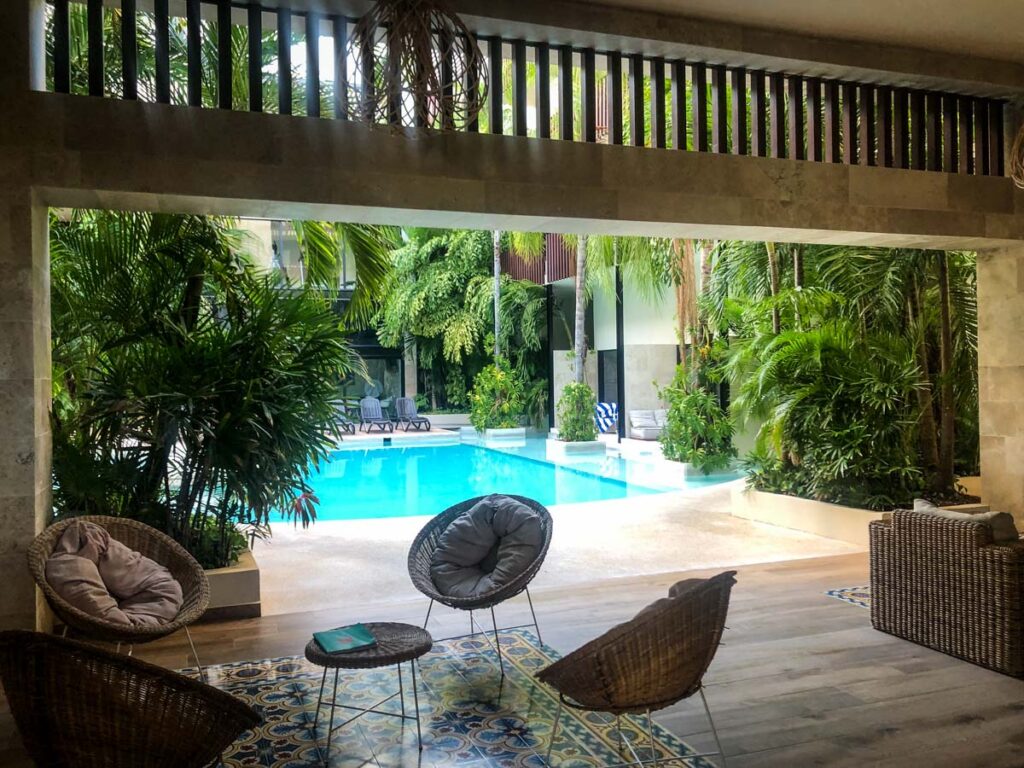
In most situations, you’ll get your surgery or dental work done and a few days later you’ll be cleared to fly back home. Depending on the procedure, you might need to travel back to Mexico to have additional work done.
The referral service really has thought of everything from start to finish for your dental needs and they help you through each step of the process. Drop your email in here if you want the contact details for the dental tourism referral service I went with!
My dental situation now
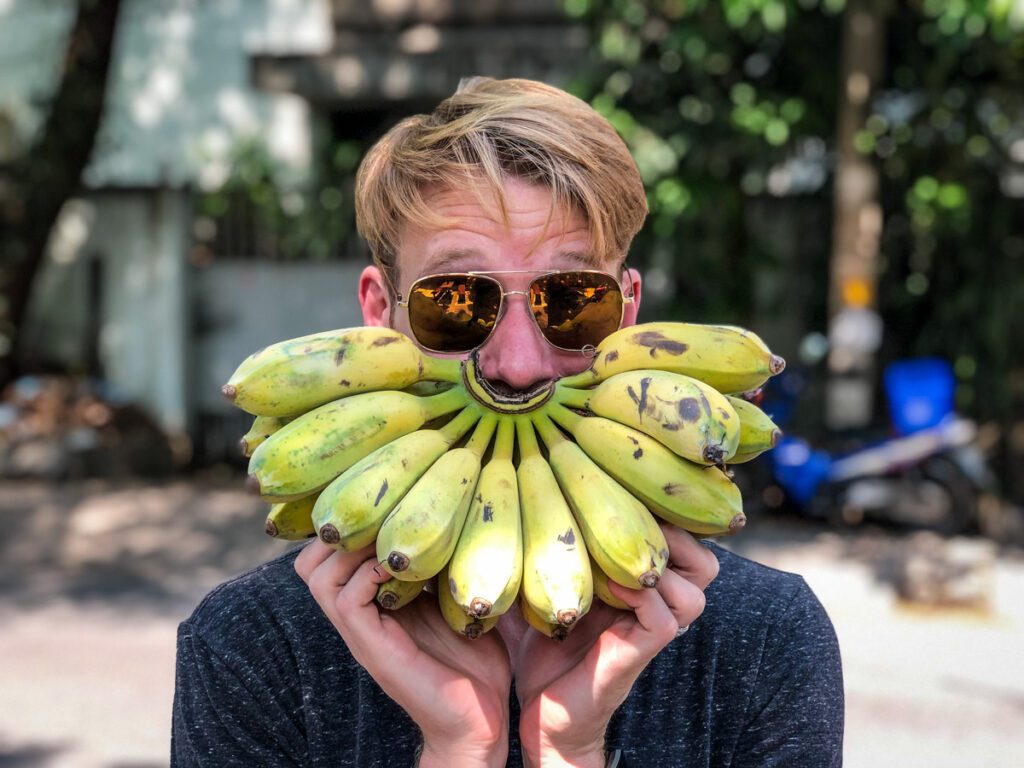
Due to my rare hereditary condition, my teeth will always be weak and will continue to fail as long as I have them. I always knew that just because of the way my teeth are, I would need to get dentures at some point in my life. Unfortunately, that time has come sooner rather than later.
The dental work in Mexico in 2021 was hopefully going extend the amount of time I have with my original teeth.
However, I went to the dentist earlier this year (Feb 2024) for a loose crown and some minor swelling, after getting the scans back, my dentists noticed that some of my infections have come back. It is causing a dull pain in my teeth and the infections are pushing up against my sinuses and therefore giving me respiratory issues.
So instead of getting dentures in 5 or 10 years, I have to get them now.
In order to do this, my oral surgeon and my prosthodontist will remove all my original teeth, place 8 or 9 additional implants in my jaw and face bone, and create a fixed implant denture for both my top and bottom teeth.
The quote I was given for the surgeries and the implant dentures was $86,000. This was a shock to our small family and had us seriously thinking about going to Mexico again.
After weeks of thinking very carefully about our current situation and my long-term health, we decided to get these procedures done in Oregon and not in Mexico. I’ll explain my reasoning below.
Note: after talking to our dentists in Oregon, they were able to donate some of their time and implants to help reduce the price a little bit. But this is still a major financial burden.
Why I’m having dental work at home
I know as soon as I share my situation I know people will have lots of questions as to why I am choosing to have this procedure done at home (Bend, Oregon) rather than going to another country where it’s cheaper.
The answer is complicated, but I’ve had quite a few life changes since my last major procedure. Here are the main reasons I’m choosing to have care in the USA at this point rather than abroad:
1. We now have a toddler
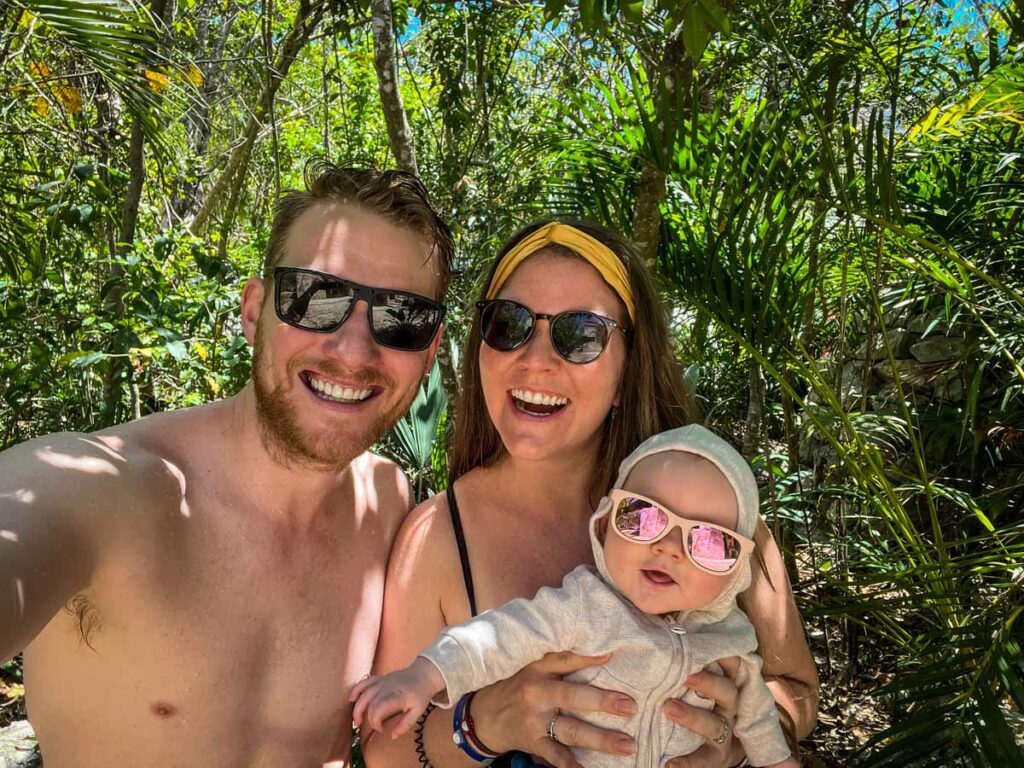
Logistically, taking her out of daycare and moving to another country for several months (or even weeks) isn’t what we want at this point. (Maybe in the future, but hopefully that would be under much happier circumstances and not for the purpose of getting a dental procedure.)
2. We own a home now
During my last procedure, we were renting, so we were able to end our lease, put our things in storage, and temporarily move to Mexico for 3 months.
Having our own home also means that I have a really comfortable space that is my own for recovery, which is more appealing than a hotel room.
3. This procedure is much bigger
Don’t get me wrong – my dental surgeries in Mexico in 2021 were significant and much more than most people go through in their lifetime – but this one is even bigger, unfortunately.
There are more risks and more of a chance for things to go wrong during the healing period which will last months. This means I want to have my dentist close by, instead of a flight away.
Additionally, this isn’t a quick process. I will have several appointments and procedures over the next 8-12 months, so it would only be practical for me to do this abroad if I wanted to move there for that duration of time.
4. Considering the longevity of my implants
It is rare for someone like me at the age of 36 to receive dentures (although my grandfather was a teenager when he got all his teeth pulled and fitted with dentures, but that was a different time).
Most people getting implant dentures are already nearing retirement age. I need these dentures to last me another 40-50 years.
Theoretically, dental implants should last the rest of your life, but there is a chance that some may fail and not integrate with your bones. Some implants may only last 10 or 20 years.
With all of these possibilities considered, I have to think about the longevity of my oral health. My dentist in Oregon has a strategic plan for my mouth and precise locations for my implants to go. So that, if some implants fail in 20 years, I would have enough viable bone left to place more implants.
Final thoughts
If we didn’t have a child and own our own home (or if I was retired), I would most likely have chosen to do this procedure in a different country so that it wasn’t such a financial burden.
Pros & cons of dental tourism
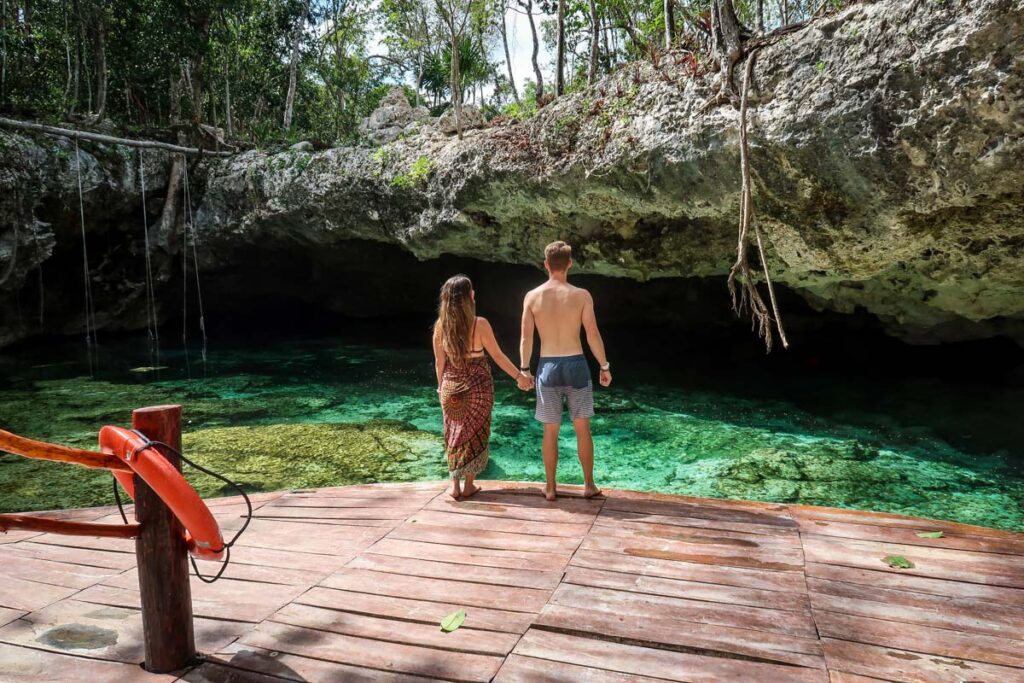
If you’re personally considering getting dental work done abroad, your mind is likely swimming with all sorts of questions and concerns.
I’ve been there.
And I want to personally say I’m sorry you’re going through this. It sucks. There’s no other way of saying it.
But you’re not alone. Hopefully I can help answer some questions, and together we can determine if dental tourism is right for you.
At the end of the day, you’ll want to get excellent care and get your dental problems behind you so that you can live your life fully. There are brighter days ahead.
The truth is that going to a different country for dental work will be the very best choice for some people, but dental tourism won’t make sense for others.
It really comes down to your particular dental and financial situation, your lifestyle, and your comfort zone.
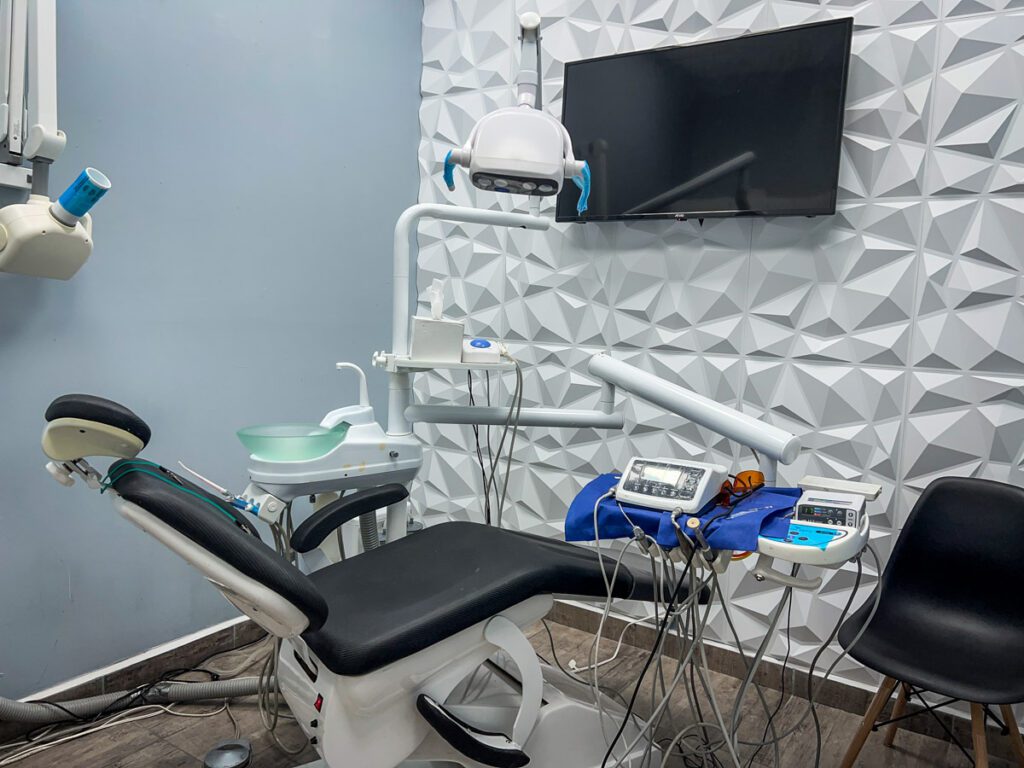
Below are all the pros and cons of dental tourism to consider as you make this (very difficult) situation.
Pros of dental tourism
- Saving money. This is definitely the biggest draw. Dental care abroad can be a ⅓ or ¼ of the cost compared to US prices. Depending on the procedures you need, this could be a savings of thousands or even tens of thousands of dollars.
- Same or similar level of quality. (With a caveat: As long as you do your research.) As previously mentioned, I’ve had dental surgeons around the world who have gotten their training in the USA and use the same top-of-the-line materials.
- Make a vacation out of it. If you’re wanting to see the silver lining, this could be another perk. I’ll be clear – having a dental procedure is no fun, and depending on what you’re having done you may spend a significant amount of time resting. We spent 3 months in Mexico and relaxing at the pool wasn’t a bad way to heal. When I was feeling up to it, we even did some road trips to Balacar, Merida, and an island vacation to Holbox. So our time in Mexico wasn’t all bad!
Cons of dental tourism
- Logistics are more complicated. Not only do you need to find a totally new dentist from who you normally see, but you’ll want a second opinion, and you’ll have to book flights and a place to stay.
- Not all dentists are top quality. This goes for the US too. There are excellent and terrible people in all professions all around the world, so this isn’t just limited to dentistry. However, when you are electing to do a big procedure in a different country, you will need to spend a significant amount of time vetting them and making sure you trust they will give you the same level of care you’d receive at home. This is why I personally recommend going through a reputable dental tourism referral service, which specializes in exactly this.
- Your dentist at home may not like the idea of you seeking care outside the country.
- It may not work well for all timelines. If you need care immediately, it may be tricky to book things in time.
- You may encounter language barriers. We personally recommend making sure your dentist (or a liaison/handler) speaks fluent English (or you speak their language fluently). You want to understand everything completely when you are undergoing a medical procedure. However, even if they’re fluent in English, there may be some barriers.
- You can’t recover in the comfort of your own home. If the idea of recovering from a procedure in a hotel room or Airbnb doesn’t appeal to you, dental tourism might not be a great choice.
- If there are complications or you need follow-up appointments down the road, it can be tricky.
- You likely will have to take more time off work. If you work remotely, this may not be an issue.
- It may be out of your comfort zone. Having a dental procedure at home can be anxiety-inducing, but when you add to that a completely different country, it may be too much for some people. Personally, I didn’t have much of a choice in the past as I had dental emergencies while traveling so I’m somewhat used to it. Plus, I’ve spent a lot of time traveling and living in other countries, so it wasn’t that big of a leap for me. However, I wouldn’t necessarily recommend pushing yourself way out of your personal comfort zone on something as serious as having a dental surgery. (There are other, more fun ways to get out of your comfort zone!) You know yourself best and whether or not this would be a con for you.
- You won’t have your support system nearby. If you live near friends or family, having them nearby can be incredibly helpful when you’re healing. Being far from home means you won’t have this support system.
Dental tourism is the best option for you if:
- Saving money is incredibly important to you, and the finances are what is standing in your way of having a necessary procedure.
- You work remotely and can continue working if needed, even if you’re in a different country.
- You aren’t attached to recovering in your home.
- You can be flexible with your timeline.
- You don’t have children, or they are grown and out of the house.
- You’ve done a bit of traveling and are confident in navigating other countries and cultures.
Getting dental work done at home is the best option for you if:
- You have a family you don’t want to uproot or leave for a significant amount of time.
- You work a job where you have to be there every day, as leaving the country would require taking more time off.
- You don’t like the idea of recovering in an Airbnb or hotel.
- You can’t be flexible with your timeline.
- Saving money would be nice, but not completely necessary.
- You haven’t traveled much and the idea of being far from home and having a serious procedure gives you anxiety.
Tips if you decide to get dental work done abroad
Are you thinking that dental tourism is a good option for you?
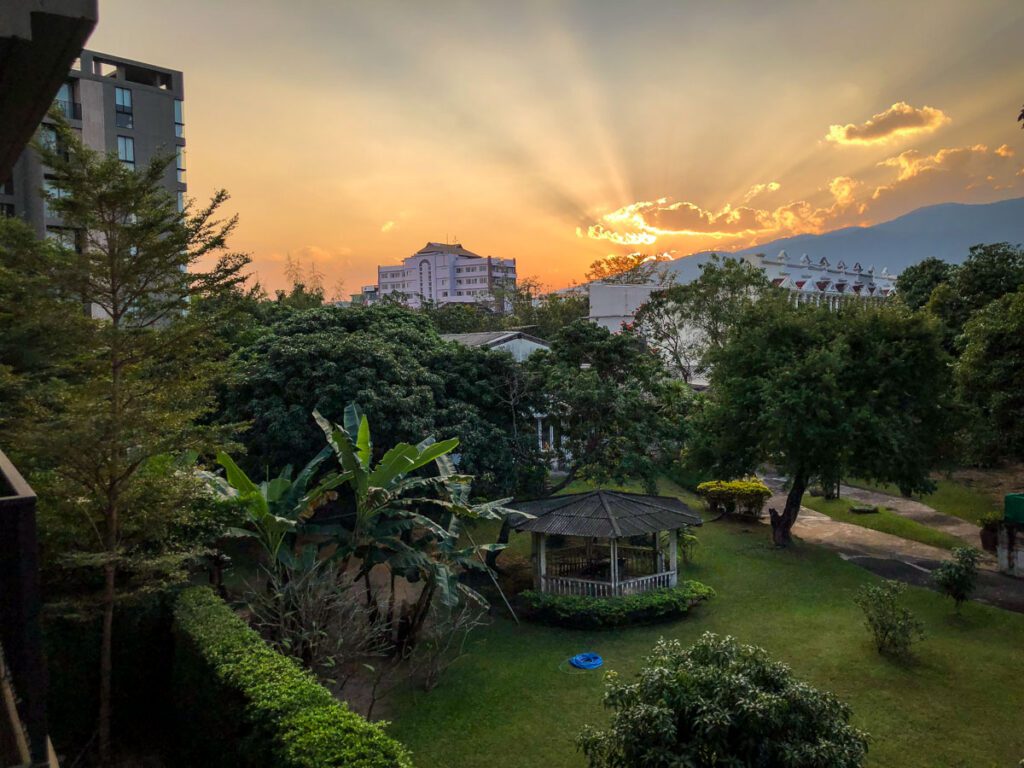
As long as you’ve read through all the pros and cons and have really put some thought into this, I think you’ll be very happy with your decision. I have only had good experiences.
Now, here are some essential tips so that you have the best experience possible.
1. Get a second opinion
Even if you’re pretty set on getting your work done abroad, make sure at least one other dentist recommends this procedure. Often, people are told the procedure they need by their home dental team but the price is what encourages them to look elsewhere, so you may already have a second opinion right off the bat.
But you may want to interview more than one dentist in the country you’re planning to go to. That way, you can compare their plans and personalities and feel more confident in the choice you’re making.
With anything medical or dental related, you’ll want at least two (sometimes more) professionals agreeing on the steps forward.
Note: It’s a good idea to tell your home dentist that you’re thinking about dental tourism, but know that they may not support it. We’ve come across some US dentists who balk at the idea right away, warning us that it will be sub-par treatment without knowing anything about the dentist that we’re choosing to work with. Other dentists completely understand and will support your choice. Personally, my family dentist knows my full history and has been really supportive.
2. Do your due diligence
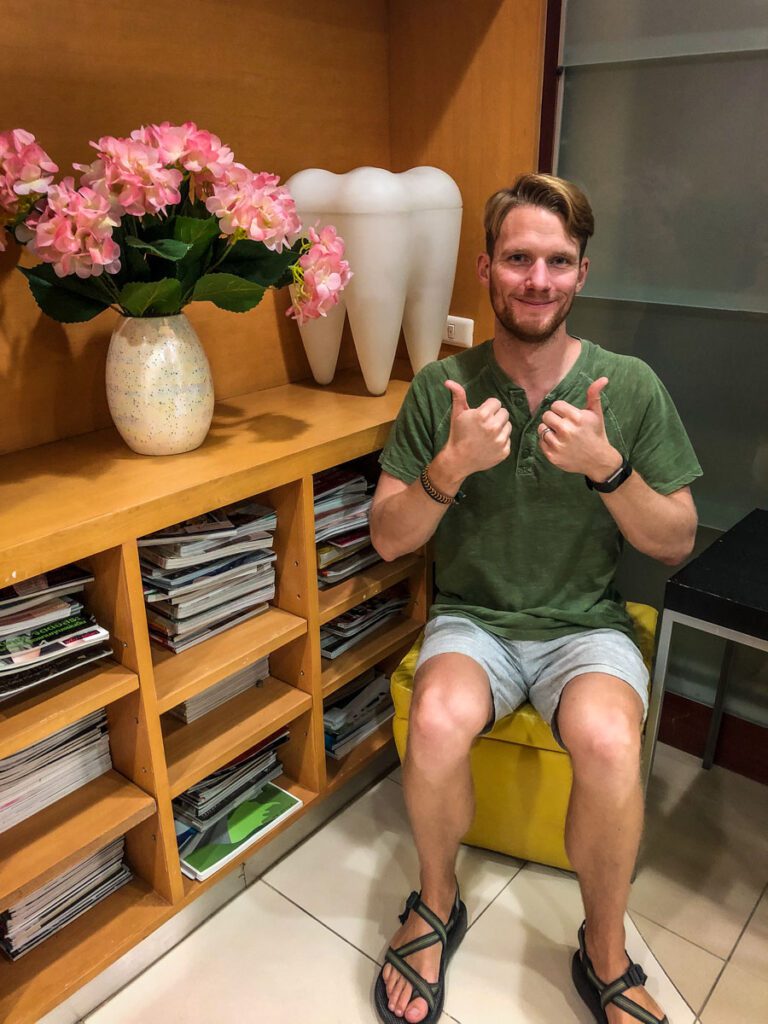
I cannot stress enough how important it is to really do your homework on the dentist you choose to go with.
In the United States there are strict regulations and protections regarding the dental and medical fields. This doesn’t mean there aren’t bad dentists in the US – there absolutely are – but you can have a little more confidence with the overall quality you’ll find without doing tons of digging.
The dentists I’ve chosen to go with abroad have been fantastic and highly-skilled:
- My dentist in Mexico was recognized as one of the top in her field and she was in high demand all over the country.
- My dentist in Thailand got her training in the USA.
Personally, I recommend going through an organization that specializes in vetting dentists. This is how I got connected with my dentist in Mexico.
Another option is to search Expat Facebook groups for the destination you’re looking for as well as reading through reviews.
Also, schedule a face-to-face video chat. Ask all the questions you have. Make sure you feel 100% comfortable before choosing a dentist.
Ask your dentist: If possible, ask your dentist if they could put you in contact with another patient who has already gone through a similar procedure. Getting dental care can seem very lonely at times, and hear advice from someone who has already experienced it can be comforting. The other patient may have additional tips that you or your dentist might not think about or extra things to make the recovery better.
3. Choose a location that you can easily go back to
While I was happy with my dentist in Thailand, it’s not a realistic spot to fly back and forth multiple times for procedures.
I knew I would likely need more than one procedure, so I landed on Mexico as it is a short and easy flight from the USA.
Bonus: Choose a place that is not only an easy flight, but one you won’t mind going back to.
4. Get travel insurance
This is something I recommend for every single trip (not just dental-related!). But if you are planning to have a medical procedure done in a different country, you 100% need to have travel insurance. Read the fine print very carefully and understand what is covered and not covered.
This won’t help with the cost of your procedure or cover anything related, but it is essential to have in case accommodation falls through or there’s another unforeseen issue on your trip.
5. Understand all the logistics of your procedures
Make sure you 100% understand the procedure, the healing time, and any follow up appointments.
Here are some questions to ask and consider:
- When you arrive in the country, will there be someone there to greet you?
- Do you need to get an X-ray or CT scan or can you send those from home?
- Where is the office where your procedure will take place?
- How long will the appointment last?
- Is this a one-time procedure or if you’ll need to come back?
- What is a typical pain level?
- What is the anticipated healing time?
- What are the risks?
- When is it safe to fly?
- What medications will be prescribed?
- Will you need anesthesia?
- How will you get to and from that appointment?
- Will there be someone else with you to help (especially if you need anesthesia)?
- Is there anything you need to avoid before and after your procedure?
- Is there anything you can do to prepare?
6. Really think about the type of accommodation you’re booking
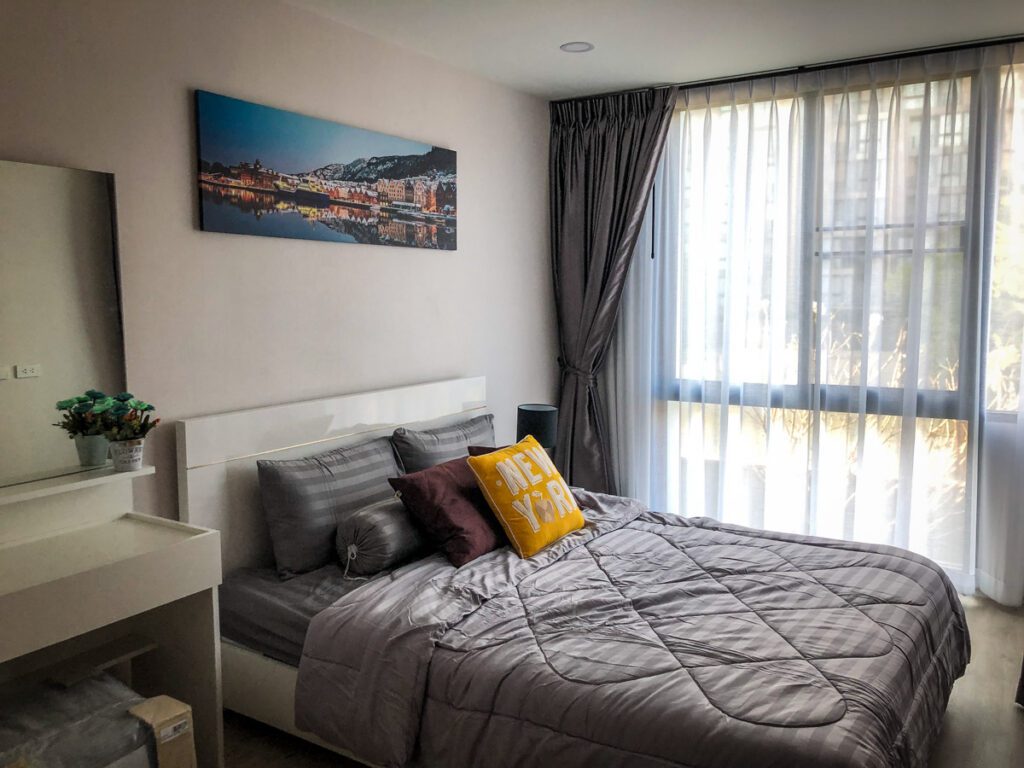
If you are having work done out of the country to save money, I’d advise you not to go as cheap as possible when choosing your accommodation.
Trust me when I say you’ll want a comfortable place to recover in.
Things I’d look for:
- Large, comfortable bed
- Nice bathroom
- Kitchen of some sort: we made mashed potatoes, pasta, and smoothies a lot, so a kitchen was clutch as I didn’t want to go out much right away
- Pool: it’s a big bonus if you have a nice pool so you can change up the scenery without leaving your place
- Good location: near your dentist and a supermarket (reasonable walking/taxi distance)
- Blackout curtains: You will need a lot of rest after your procedure and a room that doesn’t get dark will be annoying (trust me, we booked an Airbnb with gauzy curtains that we ended up leaving because it wasn’t comfortable)
- Air conditioning: you’ll want to be as comfortable as possible during recovery
- Big TV
7. Add buffer time
Don’t plan on flying in the day before your surgery or leaving just a couple of days after. Give yourself time on either end.
You’ll want time before your surgery to stock up on your prescriptions, get food, and get your bearings. Plus, you’ll want buffer time in case there are any flight delays.
After your surgery, you’ll want at least enough time that it is safe for you to fly, but also a few extra days in case you need to have a follow up appointment. Our trip coordinator from the referral service helped us with figuring out when would be an appropriate time to fly out.
8. Make a checklist
If you’re planning to get dental work done in another country, there’s a lot more to think about when it comes to logistics than having a procedure at home.
Here are some things to make sure you don’t forget:
- Video interview dentist(s)
- Book flights
- Book accommodation
- Get travel insurance
- Pack
- Take care of any house stuff (pet sitters, someone to water plants, pause your mail, etc.)
9. Stock up on some helpful products
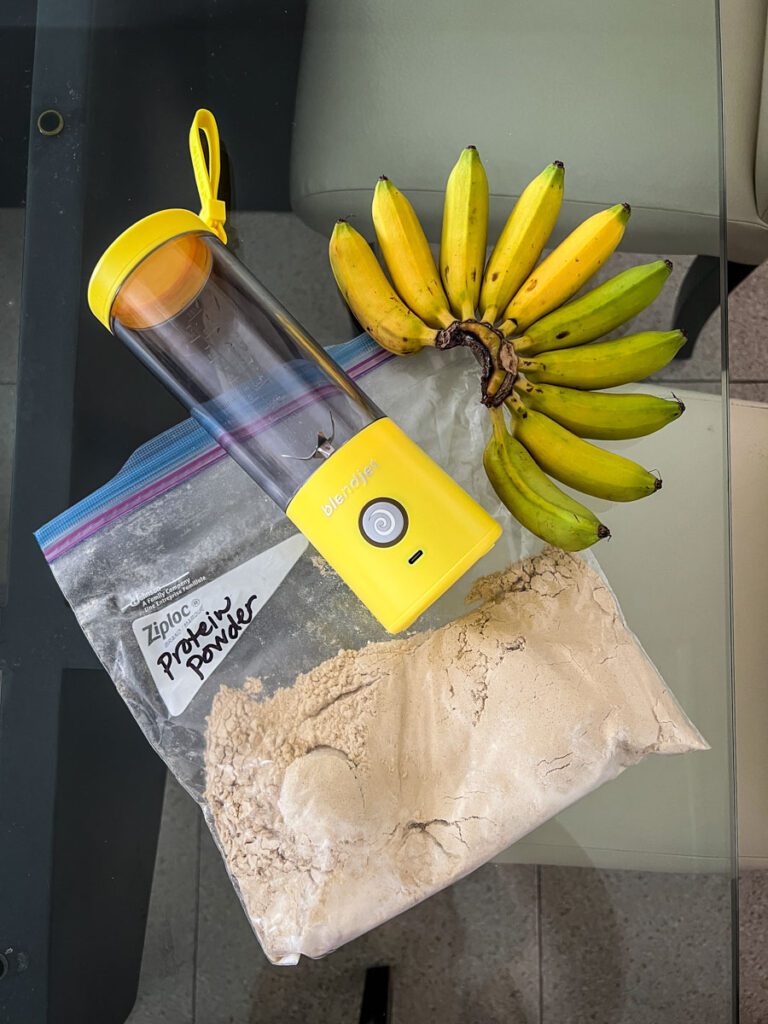
- Eye mask: having some way to create a blackout environment is super helpful to get rest in the days following your surgery. This eye mask is by far the best one I’ve ever tried.
- Supplements: If you will be on a liquid or spoon diet, it can be really hard to get proper nutrition. I have been using this algae supplement, which is absolutely packed with vitamins and minerals. You can swallow them so it’s an easy way to get a high dose of the nutrients you’ll likely be lacking during your recovery period.
- Meal replacement: Depending on the type of procedure you’re having, you may want to think about having some high-quality meal replacements on hand. Since I won’t be able to eat solid foods for a while after my full-mouth reconstruction, I’m stocking up on this meal replacement. I did a lot of research and this is one of the healthiest and cleanest I’ve found.
- Mini blender: We packed a rechargeable blender like this one when I had a procedure in Mexico so I could have fresh smoothies without leaving our accommodation.
- Ice packs: After most dental surgeries, you’ll need to apply ice to keep the swelling down and to soothe your pain. I found this facial ice pack to be really nice. I bought two so I could always have one chilling in the freezer while I apply the other.
10. Plan out your last good meal

One of our favorite things to do when traveling is to try the local cuisine. And knowing that I would be having soups or mashed potatoes for a couple of weeks after the surgery, we typically would go all out for my “last real meals”.
Pick a place close to your hotel or the most highly-rated restaurant in the city and book a reservation. You won’t regret it.
Plus, hopefully, you’ll save money by going on a dental tourism trip so you deserve to splurge a little bit.
Let us know your thoughts
I hope by sharing my story of dental tourism I have helped you ease some stress if you are going through some difficult decisions for your dental health.
If you have any other questions or you want to share your experience, please leave a comment below.
Save this article on Pinterest for later
